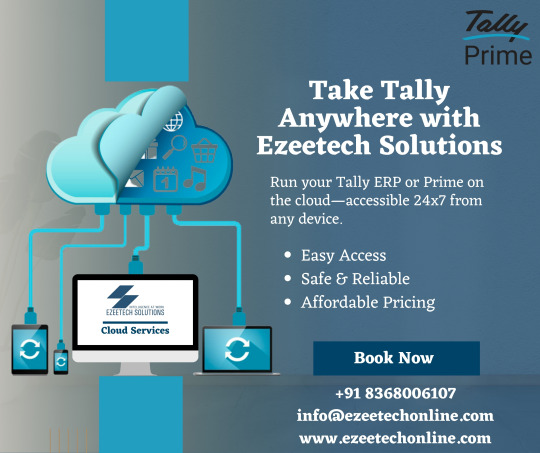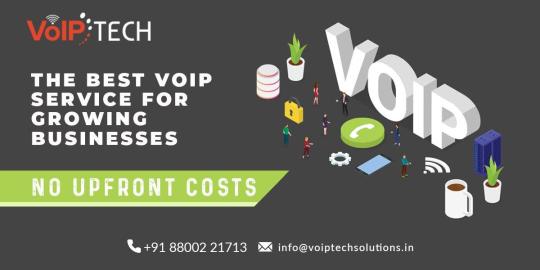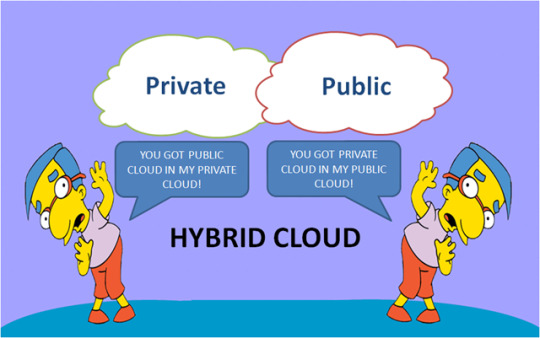#CloudForBusiness
Explore tagged Tumblr posts
Text

🏢 Tally On Cloud – Work Without Limits!
Remove the barriers of location and time.
Run your Tally ERP or TallyPrime from anywhere, anytime, on any device with Ezeetech Solutions. ✅ Secure Access ✅ 99.9% Uptime ✅ Affordable Plans
👉 Switch to Cloud Today!
#TallyOnCloud#TallyERP#TallyPrime#CloudAccounting#WorkFromAnywhere#CloudSolutions#RemoteWork#TallyAnywhere#CloudComputing#BusinessOnCloud#EzeetechSolutions#AccountingSoftware#CloudTechnology#SecureAccounting#ERPOnCloud#TallyForBusiness#CloudBasedERP#CloudForBusiness#TallyHosting#TallyAccessAnywhere
1 note
·
View note
Text
A cloud-native solution is a combination of business workflows and cloud-native technologies. Cloud gives flexibility and scalability. Also include containers, various microservices, CI/CD, and other services.
The agility and flexibility offered to businesses with cloud-native solutions greatly. Cloud-native solutions provide a further advancement of business. In IT setup, scaling operational activities means an additional cost for purchasing hardware and software resources, which is slow and resource intensive. With cloud-native solutions, particularly those utilizing microservices and containers, scaling is automated. The cost associated with the cloud-native approach is lower than that of managing an organization’s IT infrastructure.
0 notes
Text

#CloudSolutions#EnterpriseCloud#DigitalTransformation#CloudComputing#AIinCloud#BusinessInnovation#CloudForBusiness#ProphecyTechs#SmartEnterprises#CloudStrategy
0 notes
Text
How Public Cloud Is Transforming E-commerce

The e-commerce industry is growing at an unprecedented pace, and much of its success is driven by technological innovation. One of the most transformative technologies reshaping how online businesses operate is public cloud computing. From improved scalability and cost-efficiency to faster innovation and better customer experiences, the public cloud offers a powerful foundation for modern e-commerce platforms.
Unlike traditional IT infrastructures, public cloud computing provides a flexible and cost-effective way to store data, host applications, and deliver services over the internet. This allows online retailers—regardless of their size—to compete on a global scale.
Scalability for High Traffic Seasons
E-commerce traffic is unpredictable. From festive sales to flash promotions, online stores must handle huge spikes in traffic without crashing. With traditional servers, scaling for demand can be expensive and time-consuming. But public cloud platforms like AWS, Microsoft Azure, and Google Cloud allow businesses to scale resources automatically based on traffic.
For example, during Black Friday or Diwali sales, an online retailer can scale its application and infrastructure in real-time—only paying for the extra resources when needed. This ensures that customers enjoy smooth shopping experiences even during peak demand.
Reduced Infrastructure Costs
Maintaining physical servers, cooling systems, and security requires a significant financial investment. Public cloud computing eliminates the need for expensive hardware and data centers. Instead, e-commerce businesses pay only for what they use, significantly reducing operational costs.
With cloud service providers offering various pricing models—such as pay-as-you-go or reserved instances—businesses can optimize expenses while maintaining performance.
Faster Deployment and Innovation
In today’s competitive e-commerce landscape, speed is everything. Businesses must quickly launch new products, features, or entire marketplaces. Public cloud platforms offer ready-to-use tools, APIs, and microservices that allow developers to build, test, and deploy applications in hours instead of weeks.
Additionally, features such as continuous integration and deployment (CI/CD) pipelines streamline development workflows, helping businesses innovate faster and respond to customer needs promptly.
Enhanced Data Security and Compliance
Security remains a top concern for e-commerce platforms, especially when handling customer data and payment information. Public cloud computing providers invest heavily in cybersecurity infrastructure and offer advanced features such as:
End-to-end encryption
Multi-factor authentication
Automated backups and disaster recovery
Compliance certifications (PCI-DSS, GDPR, ISO, etc.)
These built-in protections ensure that e-commerce businesses maintain customer trust and meet regulatory standards without having to manage everything in-house.
Personalization Through Data Analytics and AI
Personalized shopping experiences drive higher conversion rates. Public cloud platforms enable e-commerce businesses to collect and analyze massive amounts of user data in real time. Using cloud-based AI and machine learning tools, businesses can:
Recommend products
Predict customer behavior
Optimize pricing strategies
Automate inventory management
Cloud-based analytics platforms like Amazon Redshift, Google BigQuery, and Azure Synapse allow businesses to make data-driven decisions that enhance user engagement and boost sales.
Global Reach and Accessibility
The public cloud gives e-commerce companies a global presence without the need to set up physical infrastructure in every region. Cloud providers operate data centers worldwide, allowing businesses to:
Deploy applications closer to users
Improve website load times
Offer localized content and currency
Comply with data residency regulations
This global reach is particularly valuable for small and mid-sized online retailers aiming to expand into international markets.
Seamless Integration with Third-Party Tools
Modern e-commerce platforms rely on a wide range of tools—from CRM systems and payment gateways to shipping APIs and marketing automation tools. Public cloud computing makes it easy to integrate these services seamlessly through APIs and containerized microservices.
This modular approach simplifies operations, enhances agility, and makes it easier to switch or upgrade services as the business grows.
Sustainable and Eco-Friendly
Many public cloud providers have committed to renewable energy usage and sustainable operations. By migrating to the cloud, e-commerce companies contribute to reducing their carbon footprint. Centralized cloud data centers are more energy-efficient than traditional on-premise systems, making cloud adoption a step toward greener business practices.
Final Thoughts
Public cloud computing is not just a trend—it is a foundational shift in how e-commerce businesses operate, grow, and compete. From scaling effortlessly and cutting costs to enhancing security and offering personalized customer experiences, the cloud empowers online retailers to focus on what they do best: delivering value to their customers.
As cloud technologies continue to evolve, the future of e-commerce will become even more agile, intelligent, and globally accessible. Now is the time for businesses to embrace the power of the public cloud and unlock their full digital potential.
#PublicCloud#CloudComputing#EcommerceSolutions#DigitalTransformation#OnlineRetail#AWS#Azure#GoogleCloud#CloudForBusiness#ScalableTech#RetailTech#EcommerceInnovation#careerintech
0 notes
Text
Cloud data management is essential for businesses in today’s competitive landscape. By 2028, cloud computing will be vital for business success, providing accessibility, scalability, cost efficiency, security, and disaster recovery. Key trends shaping the future of cloud data management include AI and machine learning integration for predictive analytics, hybrid cloud solutions blending on-premises and cloud systems, edge computing for real-time data processing, and quantum storage for enhanced data capacity and security. Additionally, advanced data governance will help businesses comply with regulations like GDPR and HIPAA. Stigasoft offers expert cloud solutions, ensuring scalability, security, and efficiency for data-driven success. Contact them today to explore how their services can optimize your data management.
If you want to get complete information related to this topic click HERE.
#cloud data management#DataStorageSolutions#BusinessDataStrategy#datasecurity#scalablestorage#cloud services#AIinCloud#cloudtechnology#futureofdata#CostEfficientCloud#CloudForBusiness#cloud security#Stigasoft
0 notes
Text
Cloud Literacy for Business Leaders: Why CCF Certification Is No Longer Just for Techies
In today’s digital-first world, the cloud is no longer just an IT concern, it's a boardroom priority. From marketing heads to operations managers, leaders across all departments are now expected to understand cloud fundamentals to make smarter, faster business decisions.
That’s where the Certified Cloud Computing Foundation (CCF) certification steps in not just as a technical qualification, but as a strategic enabler for modern professionals, regardless of their role or background.
🧠 What Is Cloud Literacy and Why Does It Matter?
Cloud literacy refers to the ability to understand, discuss, and leverage cloud technologies in a business context. It’s the bridge between tech teams and leadership, helping align infrastructure with business strategy.
Whether you're leading digital transformation, overseeing budgets, or scaling operations, having a solid grasp of the cloud computing foundation empowers you to communicate clearly with your IT teams and vendors.
💼 Who Should Consider the CCF Course?
The CCF course is designed for professionals beyond the IT department:
Business Analysts
Project Managers
HR & Operations Leads
Product Managers
Marketing Strategists
Procurement Officers
The cloud foundation course helps you break down the buzzwords like IaaS, PaaS, virtualization, cloud cost models and understand how they relate to everyday business.
📚 What You’ll Learn in the CCF Certification
The cloud computing foundation certification gives you:
A clear understanding of cloud service models (IaaS, PaaS, SaaS)
Knowledge of deployment strategies (public, private, hybrid)
Insight into virtualization and resource management
A foundation in cloud governance, cost control, and security basics
Real-world applications across industries
Whether you're launching a cloud-based product or evaluating SaaS vendors, this certification in cloud computing makes you a more confident and credible decision-maker.
🌍 Why This Matters in 2025
The global cloud market is set to exceed $1 trillion by 2030, and businesses that embed cloud knowledge across all functions will have a major competitive edge. In regions like Europe, India, and the Middle East, digital transformation is being driven from the top down and that means leadership needs to speak cloud.
🚀 Career Impact of a Cloud Foundation Certification
Earning the CCF certification opens up career benefits such as:
Increased cross-functional collaboration
Qualification for cloud-focused leadership roles
Competitive edge in digitally mature organizations
Higher confidence in handling cloud projects
And because the course is vendor-neutral, you’re equipped to work with AWS, Google Cloud, Azure, or any provider your business prefers.
🎯 Why GSDC’s CCF Certification?
Offered by the Global Skills Development Council, this certification is globally recognized and highly relevant. It’s structured for accessibility and packed with practical insights making cloud computing clear and actionable for business leaders and decision-makers.
#CCFCertification #CloudForBusiness #CloudComputingFoundation #LeadershipInTech #CloudLiteracy #CertificationInCloudComputing #NonTechCloudSkill#DigitalTransformation2025 #CloudFoundationCourse
For more details : https://www.gsdcouncil.org/certified-cloud-computing-foundation
Contact no : +41 41444851189

0 notes
Photo

What makes call centers deliver excellent customer service these days?Answer is with us. Contact us @8800221713 to know the best Answer.https://voiptechsolutions.in/sol.../contact-center-solution/#voipserviceprovidersinindia #voiptechsolutions #VoIP #voipphone #voipbusiness #voipserviceproviderinhyderbad #callcentersolutionon#cloudphone #clouds #cloudforbusiness #cloudphoneprovider #contactmanagement #businessphonesoftware
0 notes
Photo

Public VS Private Cloud
#cloudcomputing #publiccloud #privatecloud #funnymemes #hybridcloud #cloudforbusiness #memes
0 notes